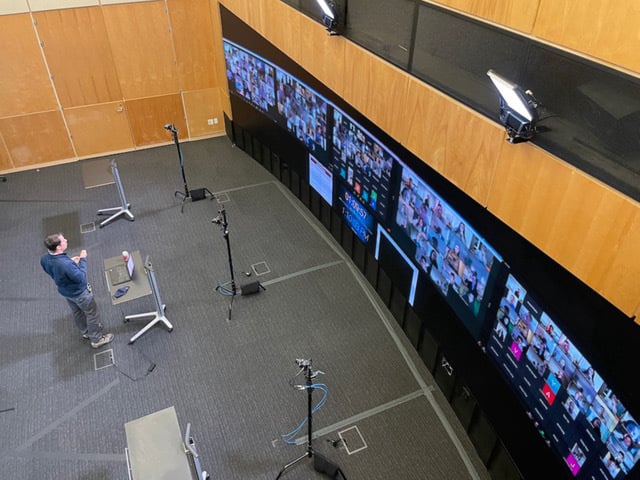A massive video wall is making distance learning a little easier on students and instructors alike.
The wall, known as the Wallenberg Zoom project, features a 32 by 8 foot screen housed in Wallenberg Hall on campus. It made its debut last fall. Designed by director of classroom innovation and technical services Bob Smith M.S. ’82, the facility is now being used by professors of political science Jeremy Weinstein and Jonathan Rodden to virtually teach POLISCI 1: “The Science of Politics.”
Smith was originally approached by Weinstein, political science professor Rob Reich M.A. ’98 Ph.D. ’98 and computer science professor Mehran Sahami ’92 M.S. ’93 Ph.D. ’99 in the fall about using the large display wall in the Peter Wallenberg Learning Theater to show all students in a class on Zoom. Smith works with Learning Technologies and Spaces under the vice provost for student affairs’ office, who decided to “roll the dice” and charged him with developing the learning theater.
The new facility has numerous benefits, according to Smith. For example, the theater’s high-quality audio and video are helping fend off Zoom fatigue for both students and teachers. He added that a countdown clock projected on the screen helps the instructors effectively manage their limited class time.
In fact, in courses with more than a couple dozen people, Smith believes that utilizing the video wall “is just about the best way to do it.” He added that the convenience extends beyond the short term: “This tool can help us with some especially large classes even when we’re all back together on campus.”
Rodden called the learning theater “a welcome change” from his cramped home office. Rodden feels much more comfortable being able to lecture in a classroom where he can stand, move around and see the students’ faces. While the theater “still does not approximate in-person teaching,” it “comes at least a little closer.”
Weinstein shared similar sentiments: “The reality is that nothing is a perfect substitute for the learning environment we can create on campus.” But he is still grateful for advances made in remote learning to increase student engagement and appreciates “the enormous creativity of the University in working with us to make the most of our teaching during the pandemic.”
He explained that the system is especially beneficial for professors who enjoy teaching in an interactive manner, as the students projected on the monitor makes it feel like he’s lecturing in a real classroom. He’s able to “move around while I speak, gauge whether people understand the material, to invite people into the conversation and to recreate the sense that we are on an academic journey together.”
The professors use the chat feature, breakout rooms and Socratic exchanges to help students actively engage in the conversation. The learning theater rotates groups of students across the screen to allow everyone to engage directly with the professors.
Students found the lectures from the theater to be somewhat more engaging, but were less enthused. Amira Dehmani ’24, a student enrolled in POLISCI 1, said after one week of classes that the new format is “much more interactive on the teacher’s end.” However, she is unsure about “how that really translates to students.” Dehmani added that not all of the new additions have been helpful, as “the multiple angles are a bit distracting.”
Dehmani did say that based on her first impressions, “the teachers seem very excited to lecture,” which she especially enjoys. The added emphasis on student interactions and utilization of breakout rooms has also been helpful, but she acknowledged there is “much more to come.”
“The lecturers are certainly doing their best with the advanced theater tech setup,” said Robert Castaneros ’24, another POLISCI 1 student. Castaneros, similar to the professors, said that the online format makes it hard to “truly engage,” but he is excited for the rest of the quarter.
Smith said that when he was a Stanford student, the University “was as much or more about the people you meet, students and faculty, and the learning you do together as anything else.” He said he hopes to “make a bad situation a little bit better by bringing a taste of the social energy of campus back into some remote classes” through the learning theater.
This article has been updated to reflect that Jonathan Rodden, not Rob Reich, is teaching POLISCI 1 with Jeremy Weinstein. The Daily regrets this error.
